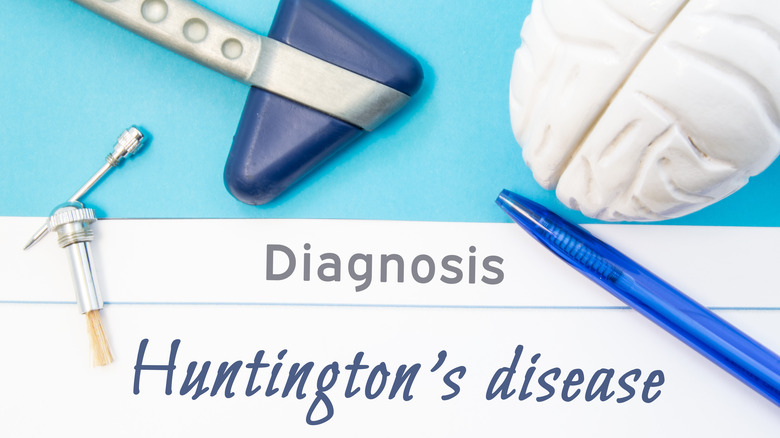Is There A Cure For Huntington's Disease?
Huntington's disease is a hereditary condition that causes the nerve cells in the brain to break down over time. According to Cleveland Clinic, this can affect your emotions, motor skills, and cognitive abilities. Symptoms typically emerge between the ages of 30 and 50, but some people may start experiencing symptoms as early as childhood or adolescence. Initial signs of Huntington's disease can be subtle, like clumsiness and losing balance.
However, symptoms of more progressive brain degeneration include uncontrollable movements, difficulty swallowing, slurred speech, slowed movements, loss of hand coordination, memory lapses, and mood swings. As the disease progresses, it can even cause dementia. Huntington's is a rare, genetic disorder that affects around 30,000 Americans. Children who have a parent with Huntington's disease have a 50% chance of developing it later in life. In addition to looking out for early signs and symptoms, Huntington's can be diagnosed with a blood test, genetic testing, and an MRI.
Huntington's disease is incurable
While there is no cure for Huntington's disease, treatment can help manage the condition and improve quality of life. For instance, Huntington's disease can be treated with medication and therapy. Medications like tetrabenazine can help manage uncontrollable movements, while diazepam can help treat muscle rigidity (via Healthline). In addition, antidepressants can be used to treat mood swings and depression. Physical therapy, on the other hand, can help improve muscle strength and coordination, preventing falls and enhancing mobility.
Occupational therapists can also assist with devices and activities that can be used to improve movement, eating and drinking, bathing, and getting dressed. For those having difficulty speaking, speech therapy can help improve your speaking ability. If you can no longer talk, speech therapists can help teach you non-verbal forms of communication. However, treatment doesn't stop the disease from progressing. People who have Huntington's disease can live anywhere between 15 to 20 years after symptoms first appear. The most common causes of death are pneumonia, injuries from falling, and complications from difficulty swallowing.


